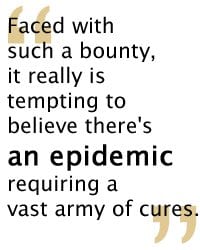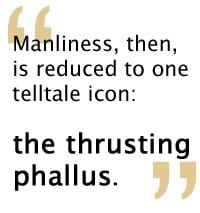“If your spouse is old and your member is exhausted, eat onions in plenty”
— Marcus Valerius Martialis (80 AD)
In my secretive teenaged experience of pornography, it was the back-of-issue advertisements for strange products that really fevered my imagination.
With their promises to heighten pleasure and prolong sexual experiences, these small-print ads gave me enticing glimpses into an as yet foreign adulthood where, evidently, tablets for extended pleasure were desirous or (gasp!) necessary.
The bottles and packages (ordinarily for pills of powdered Spanish fly) were tantalizing too, being forever out of reach.
Mine was not such a liberal household that I would be encouraged to mail-order dubious products for even more dubious purposes.
What I didn’t know then was that these products claimed to be aphrodisiacs; and, as such, they were simply the most current manifestation of a globe-spanning tradition with ancient roots.
In fact, the magical properties of aphrodisiacs (named after a to-die-for belt worn by Aphrodite herself that possessed the ability to “beget love where none exists, kindle carnal desires where there is only weariness, provide physical enjoyment instead of boredom, and initiate erotic adventure where there is otherwise only a lack of fantasy,” according to Christian Ratsch’s guide, Plants of Love) have been eagerly sought or creatively imagined throughout history.
And whatever form they take — from dried sea horse, gecko, scorpion, dragonfly, hummingbird, beetle and fly to antelope horn, pulverized jade, quail egg, raw onion, garlic clove, wolf fat, squash seed and donkey testicle — aphrodisiacs have been prized exactly for their mysterious and miraculous ability to compensate for sagging desire, failed attraction, sour moods and the sluggish responses of aging flesh.
Though those porn-mag products have since become readily available to my adult grasp, the curious teenager’s passion for Spanish fly eventually faded to nothing. I’ve never ordered as much as a sample.
Until recently, that is.
Over the past two months, a flotilla of sex-specific aphrodisiac compounds has been coursing throughout my body.
Especially formulated for and, of course, marketed to a male population that’s apparently worried about its flaccid performances, these “intimacy enhancers” — composed of miniscule doses of chicken embryo extract, Korean red ginger root, tomato lycopene concentrate, pine bark, puncture vine, oat concentrate, huang-qi root, maca root, yohimbe bark, saw palmetto berry, desert-living cistanche stem, Indonesian tongkat ali, epimedium herb, aginine, sarsaparilla root extract, ginkgo biloba root, roseroot, wild yam, Chinese wolfberry, nitric oxide, Indian woodapple, tadalafil, guava, sildenafil citrate, Chinese dodder seed, and vardenafil hydrochloride —have passed through my digestive tract and into my bloodstream.
Other than the irresistible pull of novelty, why bother with them?
Because the messages from these supplements are increasingly hard to avoid, for one.
Daily spam (from senders named ‘V-I-A-G-R-A Works’ and ‘Super Charge Your Cock!’) reminds me to “Be a New Man” or obtain a “Dick Stiffy in a Jiffy.”
Meanwhile, television and print ads for Viagra, Enzyte and Cialis sell seductive half-minute stories of thriving marriages and an increased self-confidence that inspires envy from onlookers.
Another reason to delve into this world of questionable enhancements, not unrelated to the first: so that I will “suffer no more!”
That’s what the industry’s promotional material tells me, anyway.
And if I’m not suffering now, it’ll happen soon. For guys, I’m informed, it’s all bad news performance-wise.
“Fifty percent of men age 50 or older report at least occasional erection problems,” I read. From another source, worse news: “Most men over the age of 30 are probably starting to feel the debilitating effects of lower testosterone production, which often leads to a diminished sex drive with infrequent and weaker erections.”
Conspiring together, enticing ads and alarming stats induce me to fortify my ever-weakening manhood. That way I’ll be happier and more successful, right?
If the growing presence of all these virility enhancing products implies a crisis in Erectionville, it’s equally possible to think instead that since this new industry is dependent on men feeling non-virile and in need of enhancement; it doesn’t strictly remedy an actual physical problem so much as create the desire for on-call erections and perpetually turbo-charged virility.
Arguably, like the ‘age-defying complexes’ of the beauty industry, these products promote the necessity of supplements far more than they solve actual “debilitating effects.”
Instead of “Purchase our face cream and you’ll become youthful, beautiful, desired and successful,” the message for men is: “Buy this and you’ll remain a real man.”
If the number of products is an accurate indicator, men are buying that logic.
Without question, virility supplementation is a rapid-growth market. Over the past few years the “male-enhancement industry” (as it’s named by penisreview.com, a website devoted to rating products whose sole purpose is to increase potency) has moved from discreet back-of-issue ads to front-and-centre retail, right next to calcium pills, protein powders and vitamins.
And at a handful of health food stores, sex shops, websites and gym supplement outlets, shelves of products confirm how quickly I could empty my bank account on Testo Boost, Biovigora, Herbagra, Natural V, Mega-V, Super-L, Arginmax, Viramax, Vig-RX, Erexium, Formula 4SX for Men, Vigor-Force, Eroxil for Men, Zencore, Vazomyne, Maxoderm, Vigor-Max, Vitrix, Ultimate Libido, Conquest, Magna RX+, ExtendIT, AttraXium, Veramale, Ultimate Male Energy, Viagra, Cialis, Levitra, Enzyte, Rize2, Xyience, and Ogoplex.
Faced with such a bounty, it really is tempting to believe there’s an epidemic requiring a vast army of cures.
Erections-by-the-pill aren’t cheap, either. A single, locally purchased capsule of an “herbal Viagra” pill like Rize2 or Zencore, for instance, is $11.25 (tax included), and a 10-pack of Super-L goes for $47.69 (but each dose is 2 capsules).
Locally dispensed, a single tablet of pharmaceutical giant product like Levitra or Cialis costs $17.50 (tax included). Daily “natural male enhancement” supplements such as Enzyte cost upward of $30/month.)
The majority of these over-the-counter pills are “proprietary blends,” special laboratory-measured combinations of herbs, minerals and animal parts (hyped as “super potent ingredients”) that, their manufacturers assure us, “enhance your sex drive and desire,” “boost desire and performance,” and “enhance sensation and provide firmer feeling erections.”
Or, in the words of the enthusiastic operator selling me Enzyte: “After just three months, Sir, you’ll be experiencing the hardest, most satisfying erections you’ve ever had.”
In contrast, the prescription pill manufacturers narrow their claim: “Viagra improves a man’s response to sexual stimulus. Remember, Viagra is not an aphrodisiac. In order for Viagra to work, you need to be sexually stimulated.”
My last — but not least — reason for engaging on this thoroughly enhancing journey?
Simple jack-ass curiosity (with a healthy portion of vanity).
Most men will admit that there’s something profoundly appealing about becoming a talking and walking erection, especially when they can show it off.
Freud might view it as a form of arrested infancy, but guys do feel quite accomplished and, well, manly when they’re stiff.
That may be particularly true for gay culture, where priapic Tom of Finland drawings and well-endowed porn stars are less fantasy figures than impractical role models.
Besides, according to promotional material, these chemical compounds should be able to increase my stamina and desire and enhance my sex drive.
Skeptical, I was curious to know whether they could keep their promise. Importantly, too: would they actually make me feel differently or better about myself as a male?
And since I’m a man who is primarily a bottom, there was also the question of how complete the supposed enhancement would be. Despite the vagueness of claims like “boost desire and performance,” the ultimate aim of all these pills appears to be stiff and durable erections. Manliness, then, is reduced to one telltale icon: the thrusting phallus.
Surely male sexual desire, performance and drive have far greater complexity than a “Dick Stiffy in a Jiffy”?
As the occasional recipient of all-thrust-and-no-finesse, I know that without talent and empathy, there’s little difference between a jackhammering top and a jackhammer.
As my own guinea pig, I was enthusiastic but my method was hardly methodical. Limited time and budget clashed with the massive number of products on the market.
Along with my willing lab assistant Alexander, I tried male enhancement supplements and both herbal and pharmaceutical versions of the one dose = one erection pills.
Yes, they all worked. The herbal ones, varying in their effectiveness and duration (generally kicking in well after the recommended “take one hour before an intimate encounter”), were also fun because in addition to getting erections there was the welcome effect you’d expect a real cousin of Aphrodite’s belt to produce: that primal and predatory groin-level sense of sexual fulfillment being your core purpose.’
In The Disposable Rocket, John Updike, an elder spokesman for heterosexual masculinity, unapologetically relates his views on the experience of being male:
“Yet against the enduring female heroics of birth and nurture should be set the male’s superhuman frenzy to deliver his goods: he vaults walls, skips sleep, risks wallet, health and his political future all to ram home his seed into the gut of the chosen woman. The sense of the chase lives in him as the key to life.”
For better or worse, with guys sexuality tends to always lead back to the stiff phallus delivering his goods.
The magnetic allure of Levitra or Zencore to its majority market (rather than for the smallish percentile with an actual medical condition called erectile dysfunction) results no doubt from its appeal to this enduring if reductive “I can fuck therefore I am” idea of manliness.
Of course a pill-fuelled “Dick Stiffy in a Jiffy” does not a man make. Nor does its presence in the bloodstream produce an accomplished Don Juan. But it can conjure temporary self-esteem. And, plain and simple, it’s pleasurable dumb fun.
For men with erectile dysfunction, I’m sure Viagra and company are a godsend. Others, recreational users, might want to think about their true value.
As is the case with any product that promises a magical transformation, men might want to take advice that may be as old as aphrodisiacs themselves: “buyer beware” and “buyer be self-aware.”





 Why you can trust Xtra
Why you can trust Xtra


